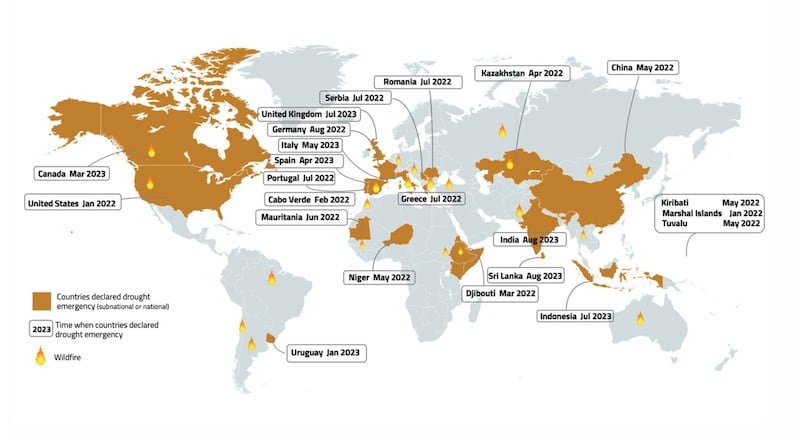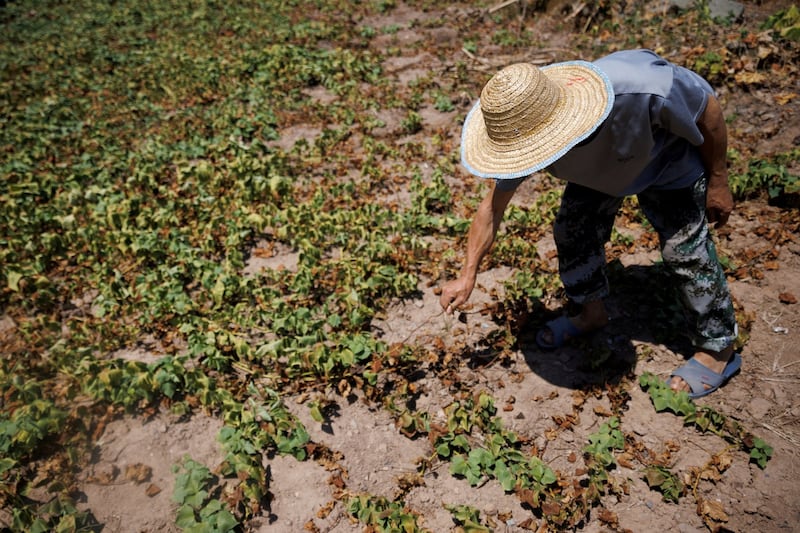Droughts intensified by global warming, described as “an unprecedented emergency on a planetary scale,” will impact billions of people with dire consequences, including food shortages and famine, said a U.N. report released Friday at the outset of the COP28 climate summit in Dubai.
About 15-20% of the population in China will face more frequent extreme-to-exceptional droughts in the 21st century, according to the report “Global Drought Snapshot.”
“By the end of the century, the duration of moderate, severe and exceptional droughts in some regions of China will double, and the drought intensity will increase by over 80%,” said the report.
“Few if any hazard claims more lives, causes more economic loss and affects more sectors of societies than drought,” it said.
Globally, 170 million people are expected to experience extreme drought if average global temperatures rise 3 degrees Celsius (37.4 degrees F) above pre-industrial levels, which is what the current global warming rates suggest.
It is 50 million more than expected if warming is limited to 1.5 degrees Celsius (34.7 degrees F), according to the U.N. Convention to Combat Desertification (UNCCD), one of three Conventions that originated at the 1992 Earth Summit in Rio de Janeiro.
The other two address climate change (UNFCCC) and biodiversity (UN CBD).

Silent disasters
While other climate impacts such as heatwaves, wildfires, and floods often hit the headlines, droughts are often silent disasters, the report said, and “the massive impacts of human-induced droughts are only starting to unfold.”
“Several countries already experience climate-change-induced famine,” said the UNCD report. “Forced migration surges globally; violent water conflicts are on the rise; the ecological base that enables all life on Earth is eroding more quickly than at any time in known human history.”
Though parts of China grappled with floods, extensive regions experienced soaring temperatures and scant rainfall.
In southern China, the Yangtze River, influenced by drought and extended periods of heat, reached historically low water levels, impacting nearly 5 million people over the past year.
This weather pattern led to a significant drop in water levels in China’s rivers, adversely impacting hydroelectric power generation and river transportation. A report has estimated insured losses from these events to be approximately US$8.4 billion.
Chinamanipulating weather
The UNCCD report also said China has used various techniques to manipulate the weather, including massive cloud seeding operations, but did not give more details.
In 2017, a Chinese military contractor planned to modify Tibetan Plateau weather, potentially shifting 5-10 billion cubic meters (176.5-353.2 billion cubic feet) of rainfall to northern China, “with unknown impacts on local residents and global climate,” the report said.
The report highlights that those with the least responsibility for causing the climate crisis are the most vulnerable: 85% of individuals impacted by droughts reside in low- or middle-income countries.

Between 2010 and 2020, highly vulnerable regions faced a 15-fold increased risk of fatalities from floods, droughts, and storms compared to areas with very low vulnerability, it said.
Another recent study concluded that the severe droughts that have devastated the populations of Syria, Iraq, and Iran since 2020 are directly attributable to human-induced global warming.
'Transformational change needed'
Scientists have said without climate change, record-breaking droughts taking place more frequently would have been projected to occur only once every four centuries.
“Unlike other disasters that attract media attention, droughts happen silently, often going unnoticed and failing to provoke an immediate public and political response,” said UNCCD Executive Secretary Ibrahim Thiaw in a statement.
“With the frequency and severity of drought events increasing, as reservoir levels dwindle and crop yields decline, as we continue to lose biological diversity and famines spread, transformational change is needed.”
The UNCCD said that improved farming techniques, including drought-resistant crops, efficient irrigation methods, and no-till farming, can potentially diminish the adverse effects of drought on farmers’ crop yields and incomes.
On Friday, the second day of COP28, more than 100 global leaders, including the U.S. and China, have committed to prioritizing eco-friendly agriculture in their climate strategies, marking a significant announcement acknowledging the relationship between climate change and food production.
The Emirates Declaration, signed by 134 countries, involves reducing emissions from agriculture, which accounts for approximately one-third of the world’s greenhouse gas emissions, by transitioning toward more sustainable production and consumption practices.
Edited by Joshua Lipes.

